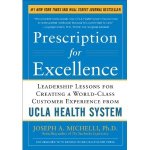 It’s in the sub-title: Prescription for Excellence: Leadership Lessons for Creating a World-Class Customer Experience from UCLA Health System by Joseph Michelli. Ponder the phrase, mull over the concept: “customer experience.” I am increasingly convinced that this phrase, “customer experience” is the best phrase to use to talk about customer service.
It’s in the sub-title: Prescription for Excellence: Leadership Lessons for Creating a World-Class Customer Experience from UCLA Health System by Joseph Michelli. Ponder the phrase, mull over the concept: “customer experience.” I am increasingly convinced that this phrase, “customer experience” is the best phrase to use to talk about customer service.
Think about the depth behind this statement: “It’s been my experience…” When a person utters those words, it communicates a whole lot. Each person passes judgment on a company within each and every experience.
In discussing this concept, Michelli refers to the book The Experience Economy: Work is Theatre and Every Business a Stage, published back in 1999 (this is a book I presented at the First Friday Book Synopsis over 11 years ago; Spring, 2000):
– from Gilmore and Pine, 1999, The Experience Economy:
• Even in difficult times, 50 percent of consumers will pay more for a better service experience.
• A full 68 percent will sever a customer relationship because they were treated poorly by a staff member.
• Companies that are successful in creating both functional and emotional bonding with customers have higher retention rates (84 percent vs. 30 percent) and greater cross-selling ratios (82 percent vs. 16 percent) compared to companies that are not.
And UCLA has developed a true customer-centric/customer-experience approach to their core business – taking care of patients. Principle 1 of their 5 core principles is this: Commit To Care — Care Takes Vision, Clarity, And Consistency. And the UCLA Health System requires each and every employee to sign the CICARE promise:
• “CICARE” – (pronounced “See-I-Care”) — the “short version”:
Connect with the patient or family member using Mr./Ms., or their preferred name.
Introduce yourself and your role.
Communicate what you are going to do, how it will affect the patient, and other needed information.
Ask for and anticipate patient and or family needs, questions, or concerns.
Respond to patient and/or family questions and requests with immediacy.
Exit, courteously explaining what will come next or when you will return.
(the longer version, teaches… elements of Courtesy; Professionalism; Respect)
I thought of all this as I had three different customer service experiences this week. I use these three “services” each and every month. They include Constant Contact, and two others. Here’s what I have experienced: whenever I call Constant Contact, the person I reach is easily understandable; is fully knowledgeable; is always polite – almost pleasant. And I always get what I need, with no hassle, and no feelings of frustration.
The second company (notice I am not naming the other two) is hit-and-miss. One time, I have a terrific customer experience. The next, maybe not. Every person I have ever called at Constant Contact seems fully ready to meet my need. This second company, I either get lucky, or I end up slightly to more-than-slightly frustrated.
The third company, well… don’t even get me started. With practically every call, the person is not all that pleasant – it’s as though I am interrupting his or her day with my question/need. They are not knowledgeable. They do not have answers. And though they are not rude, they are nowhere near pleasant.
Let’s think of these as three different spots on the customer experience spectrum. One, I would gladly recommend to you. (That’s Constant Contact). The second, I would recommend, because the service is really, really good. But don’t expect the same level of experience. The third, I’m about to drop – even though I like their “service,” and dropping it will mean more work for me. I’m simply tired of dealing with them, and I’m looking for an alternative.
Or, to put it another way — I don’t mind it when I have to call Constant Contact. I sort of mind it when I have to call the second compnay. I practically dread calling the third company.
Think about your customers, your clients. Do they walk away from every encounter with you having experienced a genuinely, hassle-free, fully liked, experience? Or — not?
By the way, there are no short cuts to providing such a true good experience culture. It takes constant attention, over the long haul. You can never let it slide!
Every customer encounter is taken personally by that customer. Every experience is judged. Every time. And each bad experience can lead to the loss of that customer (A full 68 percent will sever a customer relationship because they were treated poorly by a staff member). You don’t want that, do you?

